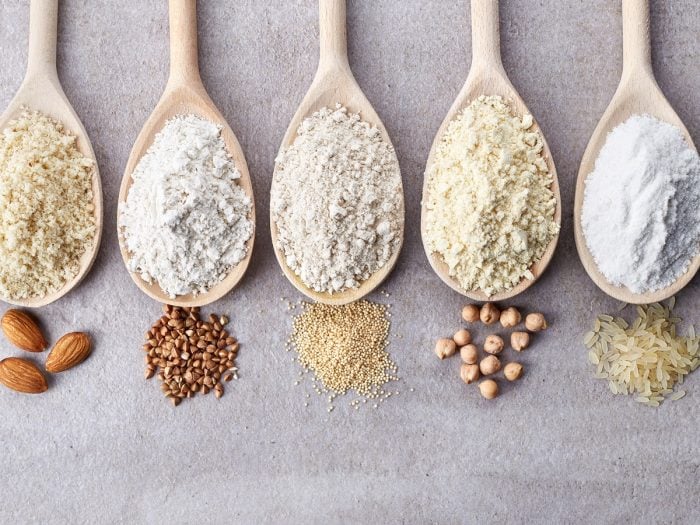Finding good flour substitutes is quite easy, and you may already have some of them in your kitchen! Flour is a catch-all name that applies to any grain that has been ground up for cooking or baking. When a recipe calls for plain flour, it is typically referring to all-purpose flour, a mix of hard and soft wheat flour. However, there are many different reasons a person might use a substitute for all-purpose flour. [1]
Flour Substitutes
Many people choose to avoid gluten, either for health or personal choice and therefore seek out flour made with gluten-free grains. Others prefer different types of flour with higher fiber or protein contents. Of course, there’s always the difference in taste that makes some alternative flours popular.
Keep in mind that different types of flour will act differently in recipes, so it’s important to remember the unique qualities of each grain when baking. The best flour substitutes include buckwheat flour, amaranth flour, almond flour, rice flour, and coconut flour among others. Let us take a closer look at them below.

The most commonly used gluten-free flours are chickpea flour, almond flour, and rice flour. Photo Credit: Shutterstock
Buckwheat Flour
Most of the heritage ancient grains are higher in fiber and nutritional content than common all-purpose wheat flour, and buckwheat is no exception. Buckwheat is actually a cereal seed and has a rich, nutty flavor. It is gluten-free and can be swapped in most recipes. However, because of its strong flavor, it’s best to use a mixture of buckwheat and a more mild flour when substituting. [2]
Amaranth Flour
Amaranth is another ancient grain that boasts high protein content and lots of amino acids. It is also very nutty and earthy tasting and should be mixed with a lighter flour to produce the best flavor as a substitute.
Almond Flour
Almond flour is made of blanched (skinless) raw almonds that are ground super fine. It is gluten-free, high in protein, and high in fiber. It is, however, also high in fat. Almond flour will not react the same way grain flours do to moisture or heat when substituting. Start with an established recipe, which will give you appropriate ratios of wet, dry, and fat to use. [3]
Rice Flour
Rice flour is another popular, gluten-free substitution for all-purpose flour. It is packed with protein and has a pleasant light flavor. However, it does not produce a moist, stable texture on its own, and you can usually find it in gluten-free blends of many flours.
Coconut Flour
Coconut flour is the finely ground flesh of coconuts and is popular in gluten-free cooking not only for its sweet, mild flavor but also its high absorbency. Recipes using coconut flour will usually call for more liquids and fats to be used, but the resulting baked item is dense and very moist. [4]
